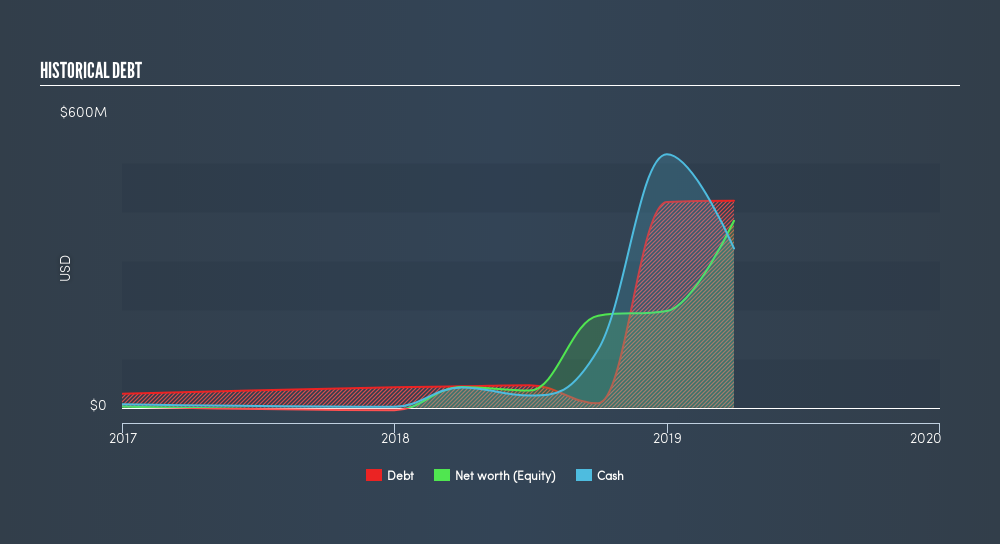Want to participate in a short research study? Help shape the future of investing tools and you could win a $250 gift card!
Some say volatility, rather than debt, is the best way to think about risk as an investor, but Warren Buffett famously said that 'Volatility is far from synonymous with risk.' So it might be obvious that you need to consider debt, when you think about how risky any given stock is, because too much debt can sink a company. We note that Tilray, Inc. (NASDAQ:TLRY) does have debt on its balance sheet. But the real question is whether this debt is making the company risky.
When Is Debt A Problem?
Generally speaking, debt only becomes a real problem when a company can't easily pay it off, either by raising capital or with its own cash flow. Part and parcel of capitalism is the process of 'creative destruction' where failed businesses are mercilessly liquidated by their bankers. However, a more frequent (but still costly) occurrence is where a company must issue shares at bargain-basement prices, permanently diluting shareholders, just to shore up its balance sheet. Having said that, the most common situation is where a company manages its debt reasonably well - and to its own advantage. When we examine debt levels, we first consider both cash and debt levels, together.
See our latest analysis for Tilray
What Is Tilray's Debt?
The image below, which you can click on for greater detail, shows that at March 2019 Tilray had debt of US$431.9m, up from US$52.5m in one year. However, because it has a cash reserve of US$325.4m, its net debt is less, at about US$106.5m.

How Healthy Is Tilray's Balance Sheet?
The latest balance sheet data shows that Tilray had liabilities of US$170.4m due within a year, and liabilities of US$524.3m falling due after that. Offsetting these obligations, it had cash of US$325.4m as well as receivables valued at US$20.1m due within 12 months. So its liabilities total US$349.2m more than the combination of its cash and short-term receivables.
Since publicly traded Tilray shares are worth a total of US$4.32b, it seems unlikely that this level of liabilities would be a major threat. However, we do think it is worth keeping an eye on its balance sheet strength, as it may change over time. Because it carries more debt than cash, we think it's worth watching Tilray's balance sheet over time. The balance sheet is clearly the area to focus on when you are analysing debt. But ultimately the future profitability of the business will decide if Tilray can strengthen its balance sheet over time. So if you want to see what the professionals think, you might find this free report on analyst profit forecasts to be interesting.
Over 12 months, Tilray reported revenue of US$57m, which is a gain of 144%. So its pretty obvious shareholders are hoping for more growth!
Caveat Emptor
While we can certainly savour Tilray's tasty revenue growth, its negative earnings before interest and tax (EBIT) leaves a bitter aftertaste. To be specific the EBIT loss came in at US$77m. When we look at that and recall the liabilities on its balance sheet, relative to cash, it seems unwise to us for the company to have any debt. Quite frankly we think the balance sheet is far from match-fit, although it could be improved with time. However, it doesn't help that it burned through US$153m of cash over the last year. So suffice it to say we do consider the stock to be risky. For riskier companies like Tilray I always like to keep an eye on whether insiders are buying or selling. So click here if you want to find out for yourself.
If you're interested in investing in businesses that can grow profits without the burden of debt, then check out this free list of growing businesses that have net cash on the balance sheet.
We aim to bring you long-term focused research analysis driven by fundamental data. Note that our analysis may not factor in the latest price-sensitive company announcements or qualitative material.
If you spot an error that warrants correction, please contact the editor at editorial-team@simplywallst.com. This article by Simply Wall St is general in nature. It does not constitute a recommendation to buy or sell any stock, and does not take account of your objectives, or your financial situation. Simply Wall St has no position in the stocks mentioned. Thank you for reading.
Market Insights
Community Narratives




